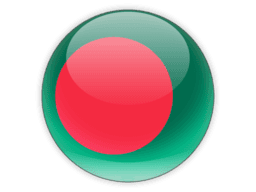
Cities of Bangladesh
Discover 50 cities across 8 regions
Barisal Division(1)
Chittagong(10)
Dhaka Division(17)
Khulna Division(5)
Mymensingh Division(3)
Rajshahi Division(10)
Rangpur Division(3)
Sylhet Division(1)
Bangladesh is a densely populated country located in South Asia, bordered by India to the north, east, and west, and Myanmar to the south-east. The capital and largest city is Dhaka, and the official language is Bengali. With a population of over 165 million people, Bangladesh is one of the most populous countries in the world.
Bangladesh is primarily an agricultural country, with over 70% of the population employed in farming. Major crops include rice, jute, tea, wheat, and vegetables. The country also has a growing industrial sector, particularly in the areas of textiles, garments, and pharmaceuticals. Bangladesh is known for its exports of garments and textiles, which are major sources of foreign exchange.
Bangladesh is a parliamentary democracy, with a Prime Minister serving as the head of government and a President serving as the head of state. The country is a member of the United Nations, the World Bank, and the World Trade Organization, among other international organizations.
Bangladesh has a rich cultural heritage, influenced by its history as part of the Indian subcontinent and its long-standing traditions of music, art, and literature. The country has a variety of festivals and celebrations throughout the year, including Eid al-Fitr and Durga Puja, among others.
Bangladesh is also known for its natural beauty, including the world's largest delta, the Sundarbans, which is home to the Bengal tiger and other wildlife. The country also has several historic landmarks and archaeological sites, such as the ancient Buddhist monastery at Paharpur.
Despite its many strengths, Bangladesh faces several challenges, including poverty, political instability, and environmental degradation. The country is also vulnerable to natural disasters such as cyclones, floods, and earthquakes, which have caused significant damage and loss of life in the past. Bangladesh has taken steps to address these issues, including implementing policies to reduce poverty and improve access to education and healthcare, as well as measures to mitigate the impact of natural disasters.
National holiday
Independence Day, 26 March (1971); Victory Day, 16 December (1971); note - 26 March 1971 is the date of the Awami League's declaration of an independent Bangladesh, and 16 December (Victory Day) memorializes the military victory over Pakistan and the official creation of the state of Bangladesh
Telephone Code
880
Local Emergency Phone
Police, Fire and Ambulance: 999; various government services: 333
Vaccinations
Hepatitis A and typhoid vaccinations are required; hepatitis B, Japanese encephalitis, and rabies vaccinations recommended. Proof of yellow fever vaccination is required if you are traveling from a country with a risk of yellow fever and are older than one year of age. See WHO recommendations.
Climate
Tropical; mild winter (October to March); hot, humid summer (March to June); humid, warm rainy monsoon (June to October)
Currency (Code)
Takas (BDT)
Electricity/Voltage/Plug Type(s)
220 V / 50 Hz / plug types(s): A, C, D, G, K
Major Languages
Bengali
Major Religions
Muslim 81.1%, Hindu 10%
Potable Water
Opt for bottled water
International Driving Permit
Suggested
Road Driving Side
Left
Tourist Destinations
Cox's bazaar; Saint Martin’ Island; Teknaf Sea Beach; Nilachal Bandarban; Sundarbans; Somapura Mahavihara (ruins of the Buddhist Vihara at Paharpur)
Major Sports
Kabaddi (contact team sport played between two teams of seven players each), cricket
Cultural Practices
Many young Bangladeshis will touch the feet of an elder as a respectful greeting, but this is not necessarily expected of foreigners.
Tipping Guidelines
Tipping is very uncommon and may be seen as ostentatious. Taxi fares may be rounded up and left with the driver as a tip, and 20-30 takas a day is common for hotel staff.
Souvenirs
Pink pearls, mother-of-pearl jewelry, hand-loomed fabrics, silk, carved masks, leather goods, folk dolls
Traditional Cuisine
Ilish macher paturi — rice and Ilish fish marinated with ground spices and wrapped in banana leaves and steamed or roasted
Geography
Area
total: 148,460 sq km
land: 130,170 sq km
water: 18,290 sq km
Climate
tropical; mild winter (October to March); hot, humid summer (March to June); humid, warm rainy monsoon (June to October)
Natural resources
natural gas, arable land, timber, coal
People and Society
Population
167,184,465 (2023 est.)
Ethnic groups
Bengali at least 98.9%, other indigenous ethnic groups 1.1% (2011 est.)
Languages
Bangla 98.8% (official, also known as Bengali), other 1.2% (2011 est.)
Religions
Muslim 88.4%, other 11.6% (2020 est.)
Population growth rate
0.91% (2023 est.)
Government
Government type
parliamentary republic
Capital
name: Dhaka
Economy
Economic overview
one of the fastest growing economies; significant poverty reduction; COVID-19 adversely impacted female labor force participation and undermined previously stable financial conditions; looking to diversify beyond clothing industry; fairly low government debt; new taxation law struggling to increase government revenues
Real GDP (purchasing power parity)
$1.001 trillion (2021 est.)
Real GDP per capita
$5,900 (2021 est.)
Agricultural products
rice, potatoes, maize, sugar cane, milk, vegetables, onions, jute, mangoes/guavas, wheat
Industries
jute, cotton, garments, paper, leather, fertilizer, iron and steel, cement, petroleum products, tobacco, pharmaceuticals, ceramics, tea, salt, sugar, edible oils, soap and detergent, fabricated metal products, electricity, natural gas
Exports
$49.386 billion (2021 est.)
Exports - partners
United States 15%, Germany 14%, United Kingdom 8%, Spain 7%, France 7% (2019)
Exports - commodities
clothing, knitwear, leather footwear (2019)
Imports
$85.303 billion (2021 est.)
Imports - partners
China 31%, India 15%, Singapore 5% (2019)
Imports - commodities
refined petroleum, cotton, natural gas, scrap iron, wheat (2019)
International Airports in Bangladesh
Discover 8 major airports serving Bangladesh
Mark Bangladesh as Visited
Add Bangladesh to your personal travel map and track your journey around the world. Share your adventures and see your progress grow!